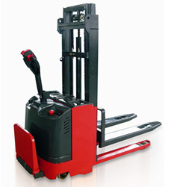News Details
Comparison between lithium battery electric forklift and lead-acid battery electric forklift
At present, there are mainly two types of batteries used in electric forklifts, one is lithium battery and the other is lead-acid battery. So, currently, which type of battery has more advantages for electric forklifts? Firstly, it should be noted that the two types of batteries actually have their own advantages in different aspects. Below, Guanhang will analyze them from multiple perspectives.
Firstly, there is the weight of the battery. Lithium batteries of the same capacity are only one fourth the weight and one-third the volume of lead-acid batteries. This means that the initial self load of lithium battery electric forklifts is much smaller, resulting in an increase of more than 20% in the operating mileage under the same amount of electricity.

Then there is the cost aspect, lead-acid batteries have more advantages. The price of a typical lithium battery is 2-3 times that of a lead-acid battery, which means that if you choose a new lithium battery, the cost will greatly increase, while lead-acid batteries are relatively affordable. In addition, lithium batteries are not easy to recycle and have low recycling costs, while lead-acid batteries can be recycled, disassembled, and reused, with higher recycling costs.
Finally, in terms of service life, lead-acid batteries currently have a service life of about 2 years and are generally charged and discharged within 300 cycles, while lithium batteries have a service life of over 3 years and are generally charged and discharged over 500 cycles. Some lithium battery manufacturers also offer a 3-year warranty.
The above is a comparison between lead-acid battery electric forklifts and lithium battery electric forklifts. Both have their own advantages from different perspectives, so there is no absolute superiority or inferiority. Everyone still needs to choose according to their actual usage situation. I hope this can help everyone.

